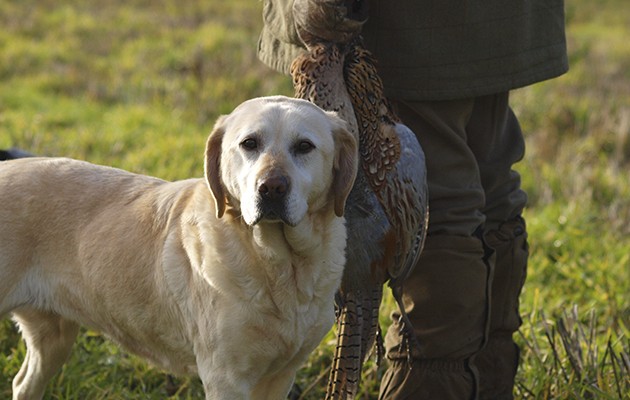Dogs’ lives are far too short. They work hard for us so we should take care of them in their all-too-early gundog retirement and old age, says David Tomlinson
Gundog retirement seems to come far too early, and knowing how to care for an elderly dog is crucial when their working lives come to an end. David Tomlinson shares his advice on how to make a dog’s final years comfortable and happy.
For more on gundogs, read outbreeding: essential for gundog survival? or field trials and tribulations.
GUNDOG RETIREMENT
One of my favourite quotes is by American novelist Agnes Sligh Turnbull: “Dogs’ lives are too short. Their only fault, really.” Talking about this with a friend, she pointed out that if they lived longer it would be even more heartbreaking when they die. Dogs’ lives are far too short – and the working career of a gundog
is briefer still. Most gundogs are still learning their trade at three, yet by eight they are already slowing down, and relatively few work much beyond 10 or 11.
If a dog has worked hard for you all its life, it’s only fair that you look after it the best you can into its gundog retirement and old age. It’s not a great deal to ask, especially as relatively few dogs live beyond their 13th birthday. The smaller the dog, the longer it’s likely to live. Statistically, you will be lucky to get an Irish wolfhound to seven, while a labrador should make it to 12.6 and an English springer spaniel to 13. Jack Russell terriers usually live well beyond their 13th birthday, while one of the longest-lived breeds is reputedly the miniature dachshund. However, a friend had a succession of mini dachshunds and never got one into double figures, though she herself lived well into her nineties.
Dogs usually decide when it’s time for their gundog retirement without you choosing for them. The main problem is hearing loss, which afflicts the majority of gundogs of senior years. As a result, elderly retrievers may run in, something they’d never done in their lives before. It’s difficult to know whether they are happy because they no longer hear the stop whistle, or whether they are frustrated by their lack of hearing. I suspect it’s the former. Deaf dogs also have an alarming habit of wandering off in the wrong direction and getting lost, which is another good reason for gundog retirement.
GUNDOG RETIREMENT: FLEUR THE SPRINGER SPANIEL
My senior springer, Fleur, worked until the age of 12, though her serious days of picking-up were then long behind her. On her last proper shooting day – a rough-shoot with friends – she committed the cardinal sin of eating a bird. There were extenuating circumstances.
The bird was stone cold, having been shot nearly an hour beforehand and fallen into a snowdrift. However, Fleur failed to appear at the end of the drive, which was most unusual. A short hunt revealed her munching happily on the cock pheasant.
Fleur is now 14, still going strong and enjoying an active gundog retirement. In her case this means showing enthusiasm for her walks and her food, and flushing the odd pheasant. She even enjoys the occasional retrieve. Yes, she is a little lame in her front fore, probably due to a touch of arthritis, but it’s nothing too serious.
She is now also profoundly deaf, so wears a small bell on her collar to indicate where she is when out on a walk. Spaniels never seem to lose their passion for disappearing into cover.
GUNDOG RETIREMENT: DOGS ARE LIKE HUMANS
In many ways, old age in dogs is similar to that in humans. Some suffer badly from dementia while others remain sharp right to the end. Most lose their hearing (are working gundogs particularly susceptible, having had guns fired over them?) and their mobility also diminishes. This is particularly noticeable when a dog can no longer jump into the back of a car, though most are happy to walk up a ramp if you provide one.
Old dogs don’t need anything like the amount of exercise they had when they were younger, so it’s sensible to reduce their food in their gundog retirement, and if you are providing dry food, adjust the protein content. One thing that rarely diminishes with age is appetite, so it’s important not to let them become obese, something that’s all too easy with most gundog breeds, and especially labradors. Poor teeth and gums will be a problem with dogs fed on soft food from a packet, so ensure that they get bones or dental chews to keep their teeth clean.
Regular health checks also make sense. Fleur was found to be suffering from pyometra, an infection of the uterus, just days before her 13th birthday (she had had one litter but had not been spayed). Fortunately, the infection was caught before any serious damage had been done; the vet performed an emergency operation and Fleur was back to normal within a couple of days. I’ve no doubt her speedy recovery was due to her overall fitness.
The hardest thing with any old dog is deciding when its quality of life has diminished to the point where it’s unkind to keep it alive – it’s amazing how few dogs simply die of old age. I use the three Ws as my gauge:
if a dog still wants to go for walks, wag its tail and wolf its food – then it’s still happy.






